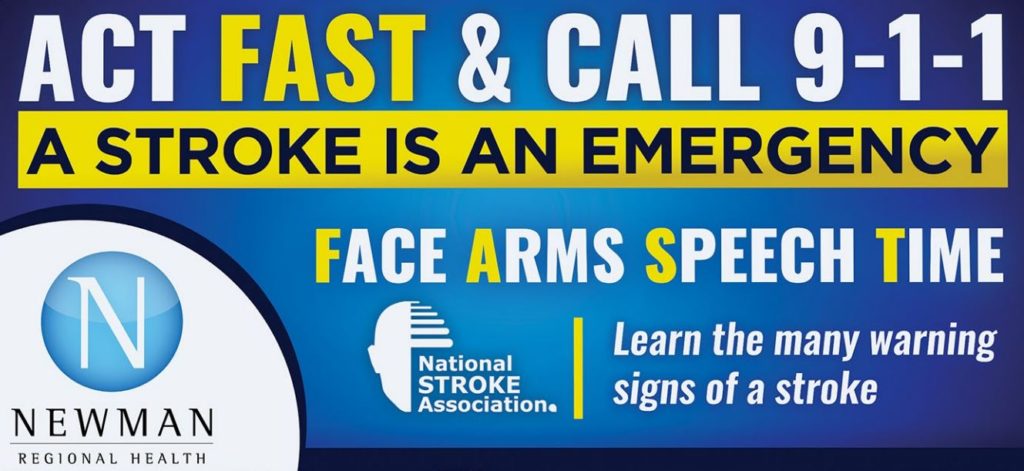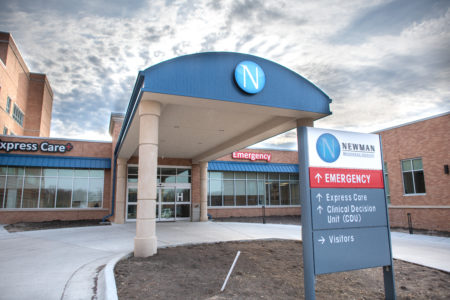STROKE

Stroke is the fifth leading cause of death and the leading cause of adult disability in the United States.
LEARN F.A.S.T. – Save a life
According to the National Stroke Association, these 4 letters and four steps may help save someone you love.
“FAST” is an easy way to remember and identify the most common symptoms of a stroke. Recognition of stroke and calling 9-1-1 will determine how quickly someone will receive help and treatment. Getting to a hospital rapidly will more likely lead to a better recovery.
Use FAST to Remember the Warning Signs of a Stroke:
- FACE: Ask the person to smile. Does one side of the face droop?
- ARMS: Ask the person to raise both arms. Does one arm drift downward?
- SPEECH: Ask the person to repeat a simple phrase. Is their speech slurred or strange?
- TIME: If you observe any of these signs, call 9-1-1 immediately.
Call 9-1-1 immediately if you observe any of these symptoms.
Note the time of the first symptom.
This information is important and can affect treatment decisions.
Additional signs to look for
There are additional stroke symptoms that can everyone should be aware of since each patient may present symptoms differently.
These symptoms are mentioned by the National Stroke Association
- SUDDEN numbness or weakness of face, arm or leg, especially on one side of the body
- SUDDEN confusion, trouble speaking, or understanding
- SUDDEN trouble seeing in one or both eyes
- SUDDEN trouble walking, dizziness, loss of balance or coordination
- SUDDEN severe headache with no known cause

Call 9-1-1 immediately if you suspect a stroke is occurring.
Treatment for Stroke at Newman Regional Health
Our Emergency Services Department is staffed by trained professionals to identify and determine the most effective course of treatment for suspected stroke patients. We have long-standing relationships with stroke centers in our region. We consult with them to treat and transfer you to the proper level of care. Our Emergency Department has the ability to administer Tenecteplase (TNK) to assist in clot reduction.
If you or a loved one does suffer a stroke, we have inpatient rehabilitation and physical therapy to guide patients down a path of recovery.
What is a stroke?
According to the National Stroke Association, a stroke is a “brain attack”. This attack happens when blood flow to an area of the brain is cut off for a multitude of reasons. A stroke can happen at any moment at any person. As the blood flow is blocked to the brain cells they begin to die, and depending upon how long the event and how severe the stroke, there can be a range of outcomes.
The website of the National Stroke Association reads, “How a person is affected by their stroke depends on where the stroke occurs in the brain and how much the brain is damaged. For example, someone who had a small stroke may only have minor problems such as temporary weakness of an arm or leg. People who have larger strokes may be permanently paralyzed on one side of their body or lose their ability to speak. Some people recover completely from strokes, but more than 2/3 of survivors will have some type of disability.”
The statistics on stroke are scary. With a stroke happening every 40 seconds in the US, nearly 800,000 people experience a new or recurrent stroke.
Reducing your risk of Stroke
Your personal doctor can advise you on various risks and steps to take on a personal level that may reduce your stroke risks. Your doctor may cover medical and lifestyle risks and uncontrollable factors such as age, gender and ethnicity.
The National Stroke Association has additional information on their website if you wish to become more informed about prevention.
Note: EEG’s are not considered a first-line stroke diagnostic tool. This article is strictly for news and information about a disease or condition. It does not provide medical advice, diagnosis, or treatment. This content is not intended to be a substitute for professional medical advice, diagnosis, or treatment. Always seek the advice of your physician or other qualified health provider with any questions you may have regarding a medical condition. Never disregard professional medical advice or delay in seeking it because of something you have read on this website. The opinions expressed in this column are intended to spark discussion about issues pertaining to various health issues.
